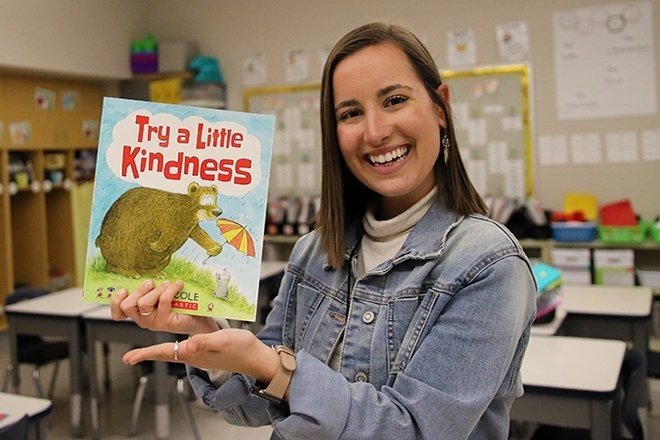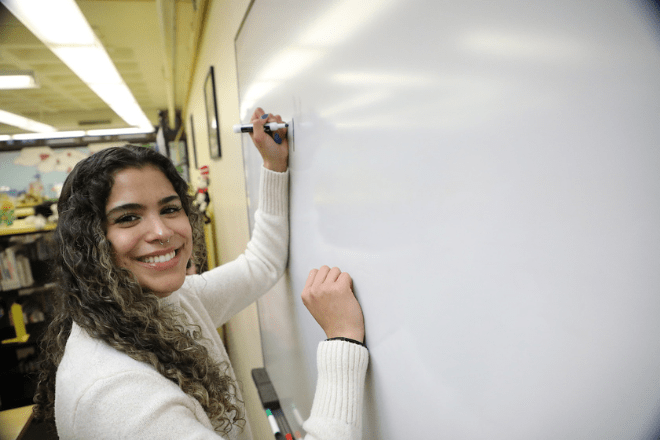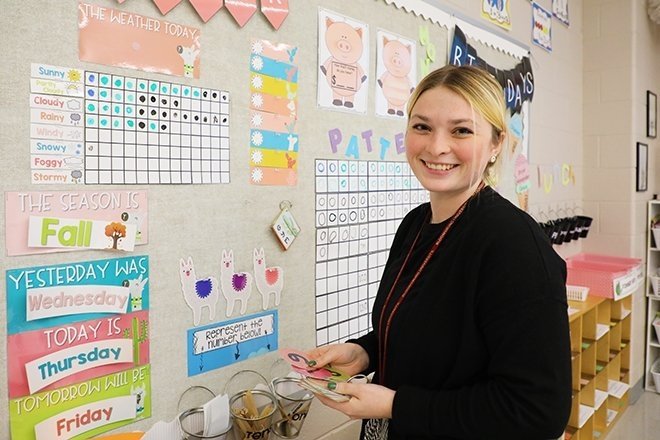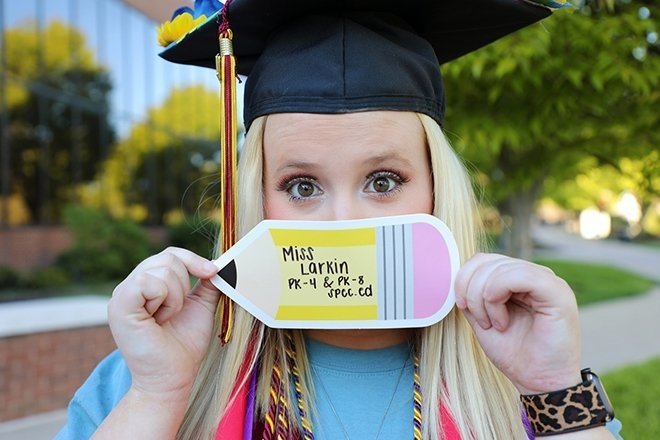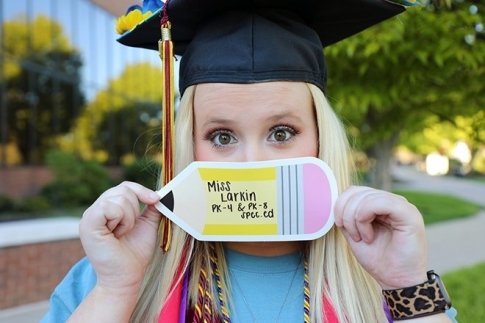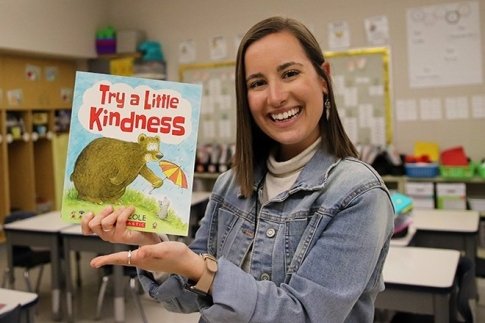
Early Childhood Education Grades PreK-4
Help shape young minds and big hearts! Join us as we continue the rich tradition of preparing the finest teachers as reflective decision-makers. Our curriculum emphasizes practical, hands-on courses with child-centered approaches. Our program features school experiences throughout all four years of study in diverse classroom settings before culminating in student teaching.
- Degrees & Offerings
-
- B.S.Ed.
- Location
-
- Bloomsburg
- Lock Haven
- Mansfield
- Program Contact
-
Interim Department Chair, Early Childhood Education, Associate Professor of Teaching and Learning
Major Showcase Days
Get a behind-the-scenes look at our program during these Major Showcase Days!
- Lock Haven: Thursday, April 24, 2025
- Bloomsburg: Friday, May 9, 2025
Space for these events is limited, register today!
The Early Childhood Education program at Commonwealth University is dedicated to preparing students to be certified to teach children from birth to fourth grade. Your courses will provide a solid foundation of basic child development theory and will combine real-world experience with the study of education methods taught by former classroom teachers.

Program Overview
- Customize your education and create additional career options through a selection of minors and certificates like Child Life Specialist (minor and certificate), Educational Technology (minor), Social, Emotional, and Behavioral Wellness (certificate), ESL (minor and certificate), and Dual Certification programs.
- Students have the opportunity to substitute teach after completing 60 credits.
- Includes specialized training in non-academic barriers (social, emotional and mental health, suicide prevention) through the McDowell Institute for Teacher Excellence.
- Students gain over 150 hours of school-based experiences prior to Student Teaching.
- Courses are taught by faculty — not graduate assistants—with extensive experience in PK-12 schools as teachers, supervisors, principals, curriculum directors, and superintendents.
- Continue your climb in one of our graduate programs like the M.Ed. Reading, M.Ed. Special Education, M.S. School Counseling, or M.Ed. Curriculum and Instruction. Our graduate programs can enhance your existing skills and knowledge as an elementary education major, increase your earning power, and prepare you for a leadership role in your field.
Courses and Curriculum
Degree RequirementsDegree Works
Note: Degree requirements effective for enrolled students beginning Fall 2023. All enrolled students, including matriculating students prior to Fall 2023, can review their degree program requirements and track progress to degree completion with our degree audit and advisement tool, Degree Works.
The post-baccalaureate program allows individuals who already hold a bachelor's degree to complete the requirements to earn teaching certification. Candidates will receive the same high quality, hands-on learning but will not need to seek a second degree.
Earn Your PreK-Grade 4 Teaching Certification in this Post-Bachelor's Plan
It's never too late to become a teacher! If you earned your bachelor's degree, have significant work with children, and have a proven track record of academic excellence, you should consider enrolling in our post-baccalaureate PreK-Grade 4 certificate program to earn the qualifications to start teaching in preprimary or primary classrooms. It is not necessary to complete a second degree to become certified. You may attend full or part time.
Many of our courses are offered online. Student teaching must be done in the surrounding area of your campus and requires 12 weeks of full time attendance.
How can I apply to the Post-Bac Plan at CU?
All students seeking their initial (first) instructional (teaching) certificate must be admitted through the Department of Early Childhood Education and Exceptionality Programs. A GPA of 3.0 or greater is required. Potential students who do not have an undergraduate GPA of 3.0 may be receive conditional acceptance and take up to 12 sh to establish the required GPA.
- Applications must be made through the Department of Early Childhood Education and Exceptionality Programs as a post-baccalaureate certification student. Both undergraduate and graduate courses may be taken during this program. Students seeking additional coursework towards the M.Ed. must apply to the graduate program, no certification is issued with the M.Ed. program.
- When application has been completed, transcripts will be evaluated by faculty in the Early Childhood/PreK-Grade 4 Program. All evaluations are done on an individual basis. All students are given written statements listing requirements and they may discuss them with their advisor at any time.
- Education Candidates must maintain continuous and satisfactory progress. All post-baccalaureate certification students may proceed a part-time basis as fits their needs with the exception of the required student teaching experience.
- Once Relevant coursework is complete, and upon recommendation of the academic advisor, a candidate is eligible for student teaching. Working in cooperation with the Director of Student Teaching, the applicant will complete the application and interview process, including a portfolio presentation, prior to any student teaching placements are made.
- At the conclusion of student teaching and successful completion of the required PECT exams, the department will make a recommendation to the Certification Officer to recommend the issuance of the PA Instructional Certificate I in PreK-Grade 4.
Have questions about teacher certification through the Post-Baccalaureate program? Email any questions or your completed application, essay, and transcripts to Dr. Amy Long at ael01@commonwealthu.edu.
Degree Requirements Application Handbook Degree Works
Note: Degree requirements effective for enrolled students beginning Fall 2023. All enrolled students, including matriculating students prior to Fall 2023, can review their degree program requirements and track progress to degree completion with our degree audit and advisement tool, Degree Works.
Pennsylvania
Commonwealth University is approved to offer Education programs that lead to certification in Pennsylvania.
Out of State
While we regularly monitor licensure and certification laws in each state, state requirements are subject to change without notice. If you are interested in certification outside of Pennsylvania, we encourage you to contact the appropriate state licensing agency to seek guidance and verify requirements before beginning a program and during your program of study. Please visit our state authorization page and www2.ed.gov for more information.
New Jersey
If you're planning to teach in New Jersey, please note you may be required to complete the edTPA, a performance-based assessment. It is strongly recommended you contact the school districts of interest and the New Jersey Department of Education for details specific to New Jersey.
- Maintain 3.0 GPA
- Complete Program – Minimum 120 credits
- Full time student – Recommended 15 credits a semester
- Required: Clearances, Background Checks, TB, and Insurance
- Successfully completing/passing Basic Skills Test for Math, Reading and Writing (currently PDE waived) (exempt based on SAT/ACT scores)
- PECT (Pennsylvania Educator Certification Tests)
- Knowing and understanding young children’s characteristics and needs, from birth through age 8.
- Knowing and understanding the multiple influences on development and learning
- Using developmental knowledge to create healthy, respectful, supportive, and challenging learning environments for young children
- Knowing about and understanding family and community characteristics
- Supporting and empowering families and communities through respectful, reciprocal relationships.
- Involving families and communities in their children’s development and learning.
- Understanding the goals, benefits, and uses of assessment– including its use in development of appropriate goals, curriculum, and teaching strategies for children
- Knowing about and using observation, documentation, and other appropriate assessment tools and approaches, including the use of technology in documentation, assessment and data collection.
- Understanding and practicing responsible assessment to promote positive outcomes for each child, including the use of assistive technology for children with disabilities.
- Knowing about assessment partnerships with families and with professional colleagues to build effective learning environments
- Understanding positive relationships and supportive interactions as the foundation of their work with young children
- Knowing and understanding effective strategies and tools for early education, including appropriate uses of technology
- Using a broad repertoire of developmentally appropriate teaching /learning approaches
- Reflecting on own practice to promote positive outcomes for each child
- Understanding content knowledge and resources in academic disciplines: language and literacy; the arts/music, creative movement, dance, drama, visual arts; mathematics; science, physical activity, physical education, health and safety; and social studies.
- Knowing and using the central concepts, inquiry tools, and structures of content areas or academic disciplines
- Using own knowledge, appropriate early learning standards, and other resources to design, implement, and evaluate developmentally meaningful and challenging curriculum for each child.
Early Childhood Education
Accreditation
- CAEP: Council for the Accreditation of Education Preparation
- NAEYC: National Association of Education Preparation
- PDE: Pennsylvania Department of Education
Clubs and Organizations
- Educational Learning Communities
- Alpha Phi Omega Professional Service organization
- Kappa Delta Pi National Education Honor Society
- PA State Education Association (PSEA)
Facilities
The Department of Early Childhood Education offers state-of-the-art learning facilities including small classrooms designed for student interaction and teaching activities, emerging technologies, and other tools. Faculty deliver courses in technology-enhanced classrooms with vast multimedia capabilities.
Field Experiences
Field Experience (Stages 1-4)
- Observation – First year students
- Exploration – Sophomores & Juniors
- Pre-Student Teaching – Senior
- Student Teaching – Senior (last semester)
The Commonwealth Difference

McDowell Institute
The McDowell Institute is dedicated to supporting the facilitation of social, emotional, and behavioral wellness of children, youth, and young adults across school and community settings. This mission is accomplished through training, technical assistance, and information.
Connect with Faculty
Applying to This Program
Apply
-
Application Process
Review the step-by-step process whether you're a first-year student, transferring to CU, or more.
-
Apply Now
By starting your application, you gain access to your personalized application portal to view your progress.
-
Scholarships
As the largest comprehensive university in north central and northeastern Pennsylvania, CommonwealthU works hard to provide a world-class education that consistently rates among the best values in the nation.
Explore More
-
Explore Commonwealth University
There's no better way to learn more than to experience Commonwealth University for yourself! Set up a campus tour or connect with us virtually.
-
Connect with Your Admissions Counselor
Applying to college is a big step. You have questions, and we have answers!
-
Understanding Financial Aid
Financial Aid can be a complex topic. Our Financial Aid team is here to tell you what you need to know and help you navigate the financial aid process.



